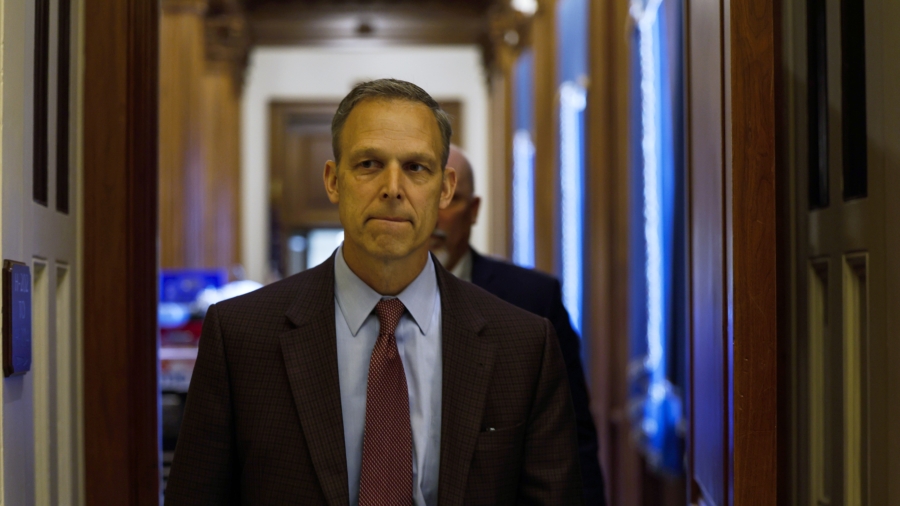A federal court has ruled Rep. Scott Perry (R-Pa.) must turn over more than 1,600 emails, text messages, and other communications to federal investigators believe may shed light on efforts to challenge the 2020 election results and the breach of the U.S. Capitol on Jan. 6, 2021.
In the summer of 2022, federal investigators seized some 2,055 communications records from Mr. Perry’s phone. The Republican lawmaker had challenged the records seizure and asserted those records were his privileged records under the U.S. Constitution’s Speech or Debate Clause. In a Tuesday memorandum opinion, U.S. District Judge James Boasberg of Washington’s federal court district ruled that Mr. Perry’s privilege claims should only extend to 396 of the communications records and that federal investigators could keep the remaining 1,659 records.
Judge Boasberg, an appointee of President Barack Obama, analyzed the 2,055 contested records through the lens of three main categories: communications with individuals outside the federal government, communications with staff and other members of Congress, and communications with members of the executive branch, which was controlled at the time by then-President Donald Trump.
Of Mr. Perry’s communications to individuals outside the federal government, Judge Boasberg ruled he could retain privilege over discussions of non-election-related policy matters and requests for evidence of alleged fraud in the 2020 election. On the other hand, the judge ruled Mr. Perry has no privilege over communications in which he shared evidence of alleged fraud in the 2020 election with individuals outside of the federal government; discussed non-legislative methods to combat the alleged fraud; discussed then-Vice President Mike Pence’s obligations under the Electoral Count Act; and discussed the breach at the U.S. Capitol on Jan. 6, 2021.
Of Mr. Perry’s communications to staff and other members of Congress, the judge ruled he had privilege over discussions of legislative proceedings; discussions about election fraud, whether he should certify electoral votes from the 2020 election, and information relating to legislation about election procedures ahead of Congress’s vote to certify the 2020 election; discussions with fellow members of the House Freedom Caucus, and about other matters of business before the House of Representatives.
The judge ruled that Mr. Perry has no privilege over records, including discussions about newsletters and press releases outside the legislative sphere; discussions of efforts to work with the executive branch and state legislators to counter alleged election fraud or otherwise influence those individuals; discussions of press releases, communications about alleged election fraud; and discussions of lawsuits and other non-legislative efforts to contest instances of alleged election fraud.
Of the congressman’s communications with members of the executive branch, Judge Boasberg ruled he could retain records of his requests for members of the executive branch to share evidence of alleged election fraud and discussions of other non-election-related policy issues before Congress. On the other hand, the judge ruled Mr. Perry has no privilege over discussions of non-legislative efforts to contest alleged election fraud; efforts to influence the actions of members of the executive branch dealing with alleged election fraud; and discussions of the procedures that then-Vice President Pence must follow under the Electoral Count Act.
It’s not entirely clear what evidence federal prosecutors may glean from Mr. Perry’s communications, though there have been some glimpses in the months-long legal battle over the records. Judge Beryl Howell, another Obama appointee in the D.C. federal court district who previously handled the records dispute, revealed that 930 of Mr. Perry’s contested communications involved members of the executive branch and were “proactive, persistent, and protracted.”
The now-defunct House Committee investigating the Jan. 6, 2021, Capitol breach claimed in a December 2021 letter that they had evidence Mr. Perry sought to install Jeffrey Clark, an official who supported President Trump’s challenges to the 2020 election, as the acting U.S. attorney general. Mr. Clark currently faces prosecution in Fulton County, Georgia, along with President Trump and 17 other co-defendants, over an alleged conspiracy to unlawfully contest the state’s 2020 election results. Mr. Clark faces similar allegations in D.C. federal court over an alleged conspiracy to illegally upend the 2020 election results.
Last year, then-Rep. Liz Cheney (R-Wyo.) also claimed Mr. Perry sought a pardon from Trump in the days following the Jan. 6 Capitol breach. Mr. Perry has said this claim is an “absolute, shameless, and soulless lie.”
NTD News reached out to Mr. Perry’s office for comment on Judge Boasberg’s latest ruling but did not receive a response by the time of this report.


